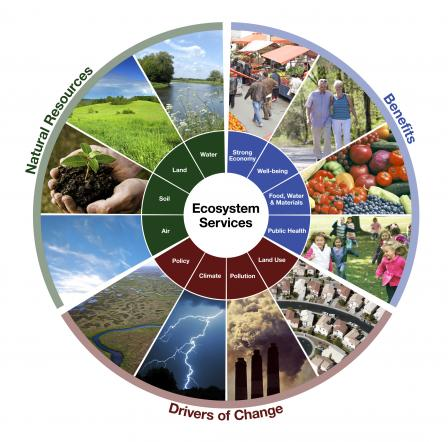What are Ecosystem Services (ESS)?
According to the 2000 Millennium Ecosystem Assessment Report MA Millennium Ecosystem Assessment, Ecosystems and Human Well-being — A Framework for Assessment(Island Press, Washington DC.): “Ecosystem services are the benefits people obtain from ecosystems. These include provisioning services such as food and water; regulating services such as regulation of floods, droughts, land degradation, and disease; supporting services such as soil formation and nutrient cycling; and cultural services such as recreational, spiritual, religious and other non-material benefits”.
As a first impression, ESS seems to be a means to promote environmental safeguarding in a setting that stimulates nature to take its own course. In reality, what the ESS concept endorses is the actual monitoring of components of nature; meaning, components are categorized and quantified as elements that are aggregated and exploited for profit.
Challenges in ESS studies
While this notion is successful in increasing the perceived value of the environment and its processes, ESS can also be manipulated to change natural environments, i.e. land use and land cover, into a human-centered self-serving mechanism and simultaneously tends to ignore the original function of ESS, the sustainable conservation and regulation of nature.
An example of this is the deforestation of lands in favor of and conversion into agricultural land. This conversion of land then leads to the production of foodstuffs that are sold for profit; under the pretext and justification of the benefit of having a ‘provisioning service’.
Another way in which ESS is co-opted for profit is through the concept ‘subjectivity of valuation’. In such a case, climate regulation and oxygen provisioning are not necessarily economic goods. In addition, the practice of framing nature in terms of ESS highlights the commodification of nature such that natural resources and land are only as useful as the rate at which they can be exchanged and priced. In retrospect, services are priced through subjective economic practices and thus are a social construct, as such ecosystem services are defined by time, geo-location, and social processes.
Bio-energy generation is a case in point. From large scale farms as a provisioning service, bio-energy generation offers low cost energy supply and helps create jobs. Nonetheless, it promotes land grabs and exploitation accompanied with an overall decrease in biodiversity.
The adoption of ‘Ecosystem Services’ has been useful in framing assessments that affect land use; it also shapes the valuation of nature and enables it to have a monetary worth. This categorization allows for the recognition of trade-offs, rival goods, and disservices where nature negatively impacts value goods, further reinforcing the effect of the subjectivity and context specificity of the services.
Ecosystem services and disservices need to be redefined within the context of subjective valuation. This then begs the question of where the line of moral judgement and scientific analysis is to be drawn.


